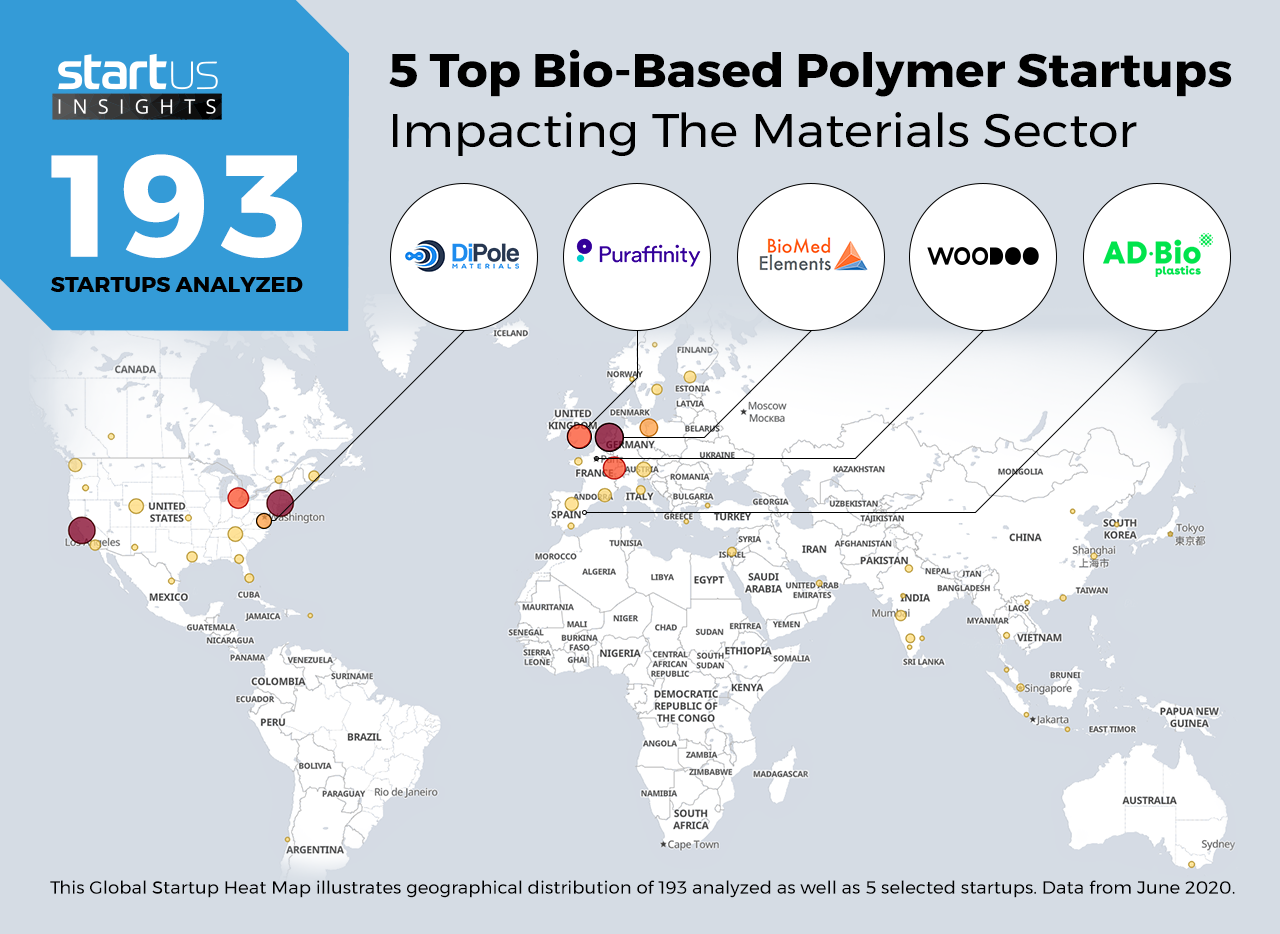Our Innovation Analysts recently looked into emerging technologies and up-and-coming startups working on solutions for the materials sector. As there are a lot of such startups working on various different applications, we decided to share our insights with you. Here, we take a look at 5 promising biopolymer companies.
Heat Map: 5 Emerging Biopolymer Startups
Through the Big Data & Artificial Intelligence (AI)-powered StartUs Insights Discovery Platform, covering over 3 790 000+ startups & scaleups globally, we identified 193 biopolymer startups. The Global Startup Heat Map below highlights the 5 biopolymer solutions you should watch as well as the geo-distribution of all 193 startups & scaleups we analyzed for this research. Based on the heat map, we see high startup activity in the US and Western Europe.
Interested to explore all 190+ bio-based polymer startups & scaleups?
ADBioplastics manufactures Bioplastics
While plastics are often convenient, they are also one of the major types of non-biodegradable waste. Bioplastics aim to offer the functional properties of plastics, but with the benefit of biodegradability. These are bio-based polymers derived from renewable biomass sources or agricultural products. Bioplastics currently find applications in packaging, textiles, construction, and agriculture, among others.
ADBioplastics is a Spanish startup that develops bioplastics. It produces premium-grade polylactic acid (PLA) from corn, sugar cane, or sugar beet. The startup’s patented BlockPLA technology improves conventional grades of PLA by adding enhanced barrier properties and making it biodegradable and compostable. Moreover, the solution is amenable to thermoforming, injection, and injection blowing and finds application in different sectors.
DiPole Materials develops Nanofibers
Nanofibers enable a range of new applications, thanks to their high surface-area-to-volume ratio. Startups and companies are working to incorporate them into energy generation and storage, water treatment, and biomedical applications. Unlike synthetic alternatives, nanofibers obtained from bio-based polymers offer added advantages for use in medicine and healthcare. These include biocompatibility, biodegradability, antibacterial activity, and low immunogenicity.
The US-based startup DiPole Materials offers custom nanofiber manufacturing solutions. It uses electrospinning to create scaffolds for tissue engineering, functional fibers, and other specialty applications. The startup leverages its BioPaper technology to offer a gelatin-based three-dimensional (3D) fibrous scaffold for 3D cell culture and bioprinting. It accelerates the development of novel medical devices while also improving the pharma drug screening process.
BioMed Elements advances Orthobiologics
Orthobiologics are biomaterials, such as bone cement, bioactive glass, or stem cells, that find application in orthopedic and dental surgeries. They promote the regeneration of bones or surrounding tissues. Orthobiologics that constitute bio-based polymers improve the wound healing process as they are usually antimicrobial and promote cell proliferation. Additionally, since they are bioresorbable, they do not need an extra procedure for removal.
BioMed Elements is a Dutch startup that develops biomaterials for the medical device and cosmetics industry. It uses the BioMed Core technology to manufacture biopolymers into various functional end forms, such as spherical submicron particles. The startup’s solution mixes with various materials, such as ceramics, tissue, and bone, to produce orthobiologics for orthopedic and dental surgeries.
Woodoo offers Augmented Wood
Wood is perhaps one of the oldest biomaterials in commercial production. Bio-based polymers extracted from wood, such as lignin or cellulose, are in demand in the specialty chemicals and composite materials market. More recently, startups are exploring the possibilities of supplementing wood with other biopolymers to create augmented wood. It is weather-proof, more fire-resistant, and much stronger. This makes it suitable for different applications in the automotive and construction sectors.
French startup Woodoo uses bioengineering to produce augmented wood. The startup’s technology removes air and lignin from wood, while maintaining its structural integrity, and then reinforces it with a bio-based polymer. It enables the use of otherwise unused, low-grade wood in smart surfaces and construction materials. The extracted high-grade lignin is also a popular bio-based polymer in the specialty chemicals market.
Puraffinity makes Adsorbents
Efficient water treatment is a challenge in point-of-use systems, groundwater remediation, industrial manufacturing, and other utilities. Per- and polyfluoroalkyl substances (PFAS) are a class of inert, non-wetting, and degradation-resistant chemicals that have adverse health impacts. Existing filtration methods such as activated carbon, reverse osmosis, and ion exchange resin do not effectively remove PFAS. Bio-based polymers offer promise in the removal of PFAS and other water treatment challenges.
Puraffinity is a British startup that develops advanced materials for environmental applications. It combines advances in bio-based polymers and supramolecular chemistry to obtain novel adsorbents. The startup offers a Customized Granular Media (CGM) that removes most suspended solids, such as PFAS, from water samples. The media is also regenerable, easy to use, and has a small carbon footprint.
Discover All Emerging Materials Startups
The materials startups showcased in this report are only a small sample of all startups we identified through our data-driven startup scouting approach. Download our free Materials Innovation Report for a broad overview of the industry or get in touch for quick & exhaustive research on the latest technologies & emerging solutions that will impact your company!








